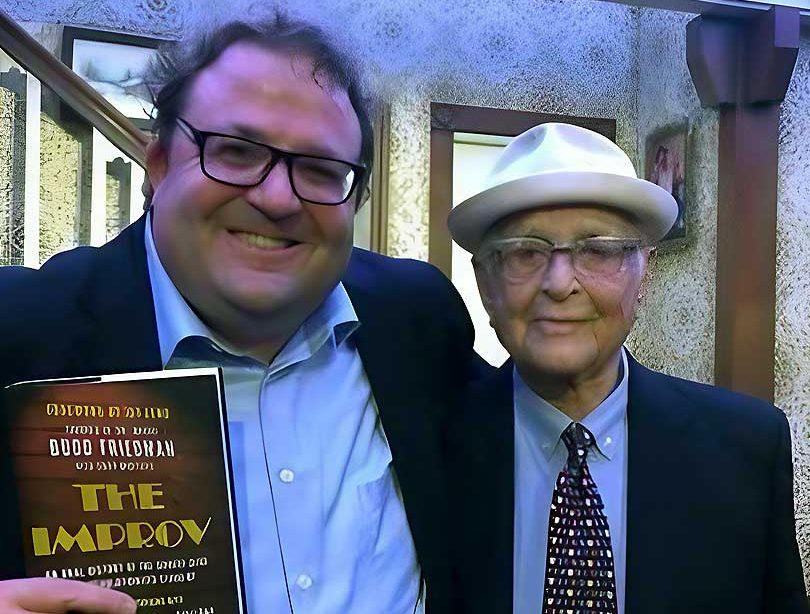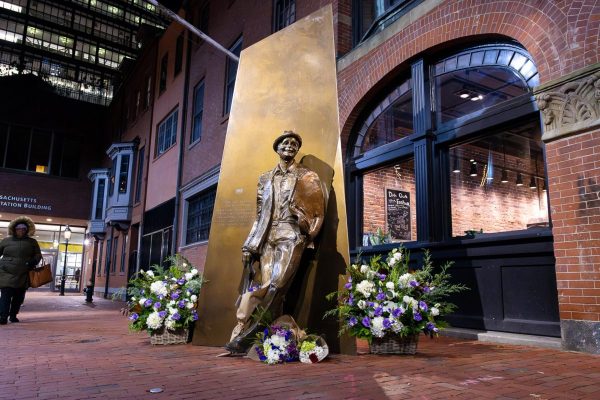
Tripp Whetsell ‚Äò94 has been a fan of Norman Lear shows ever since he learned to talk.¬Ý
Born two months after “All in the Family” aired in 1971, Whetsell, affiliated faculty in Comedic Arts at Emerson and former Beacon writer, grew up watching Lear’s shows, which he said were “the best shows in the world.”
‚ÄúIn some ways, I feel like Norman helped raise me,‚Äù Whetsell wrote in the introduction of his latest book, ‚ÄúNorman Lear: His Life & Times,‚Äù which is now available on Amazon and Barnes and Noble.¬Ý
Like the millions of viewers who fell in love with his shows, Whetsell was drawn to Lear‚Äôs ability to bring real-life issues to the sitcom world. Writing a book about Lear‚Äôs life and career came naturally for Whetsell as both a die-hard fan and a long-time entertainment journalist. His book on Lear details his seven-decade career and life from birth in New Haven, Connecticut, in July 1922 to his death in Los Angeles in December 2023 at the age of 101.¬Ý
![]()
“​​He was the man who changed television,” Whetsell said. “I was just always interested in the man who was behind them.”
TV writer and producer Lear ‚Äò44 revolutionized television in the ‚Äò70s by bringing political and social commentary into situation comedy. His beloved shows like ‚ÄúMaude,‚Äù ‚ÄúGood Times,‚Äù and ‚ÄúThe Jeffersons‚Äù highlighted families who experienced poverty, racism, and prejudices.¬Ý
Since 2020, Whetsell has been teaching a class about Lear‚Äôs life and influence on American entertainment, a course that Lear has Zoomed in to twice to talk to students and answer questions. The book, Whetsell said, is an extension of the class.¬Ý
The biography is the only book to depict the entirety of Lear’s life, Whetsell said. Other books, including Lear’s autobiography, have only touched on snippets of his career.
“No one has actually written an objective, birth to present portrait of his life,” Whetsell said. “My objective was to look at his life and creative career within this full totality and show how his trials would impact his creativity.”
Divided into four parts, the biography captures intimate and behind-the-scenes moments of Lear’s TV shows and his life. It highlights his greatest achievements of becoming one of the highest-paid comedy writers during the early 1950s and becoming the oldest Emmy winner ever two years in a row. Yet, it also unveils the more difficult parts of his life, like his turbulent first two marriages and his father’s three-year prison sentence when he was nine years old.
While the book does not include an exclusive interview with the TV legend himself, it features nearly two dozen interviews with colleagues and actors like Adrienne Barbeau, who played Carol Traynor in ‚ÄúMaude‚Äù and the late John Amos who played James Evans Sr. in ‚ÄúGood Times.‚Äù¬Ý
An entire chapter is devoted to Lear‚Äôs time at Emerson, which he attended in 1940 on a scholarship he won in an American Legion oratory competition when he delivered a speech entitled ‚ÄúThe Constitution and Me,‚Äù inspired by his Jewish identity. Although Lear dropped out of Emerson to enlist in the Air Force to fight in World War II, the college awarded him an Honorary Doctorate of Humane Letters in 1968.¬Ý
In 2018, he started an Emerson scholarship in his name to support talented students from first-generation, underrepresented, and underserved backgrounds who aspire to careers in writing for theater, television, film, and other genres. That same year, he celebrated ‚ÄúNorman Lear Day‚Äù on Emerson‚Äôs Boston campus which featured the unveiling of a statue of him in the Boylston Place alley.¬Ý

The book is a tribute to Lear‚Äôs impact on television and social change.¬Ý
‚ÄúNorman Lear was such a huge figure in television history,‚Äù Whetsell said. ‚ÄúAnyone who wants to know about the history of television needs to know about his shows, because they did so much for television.‚Äù¬Ý